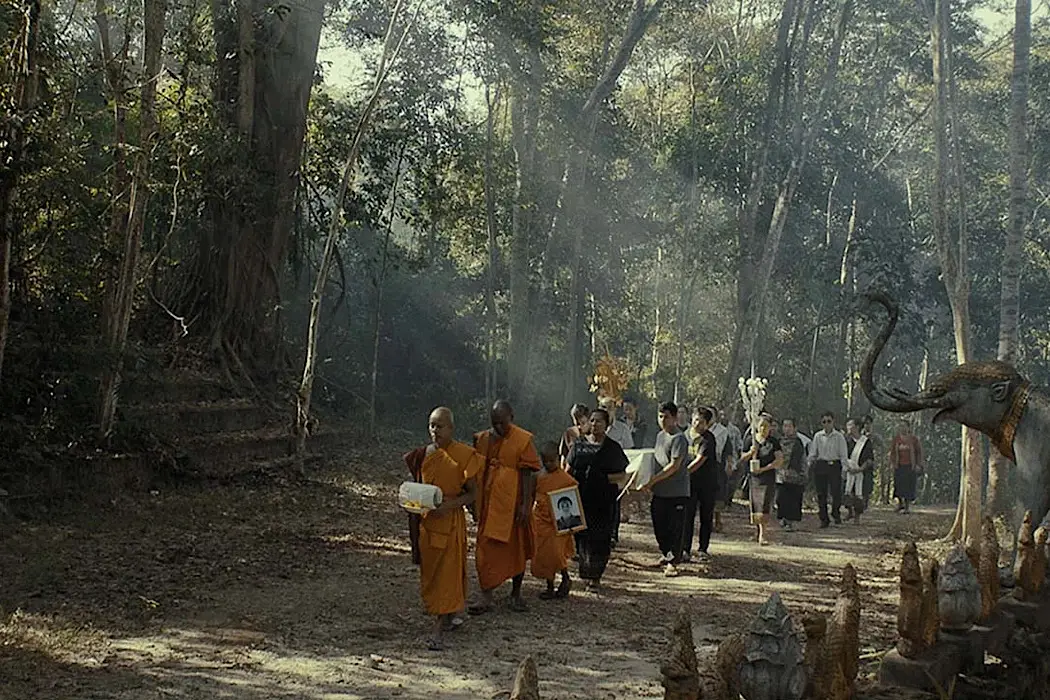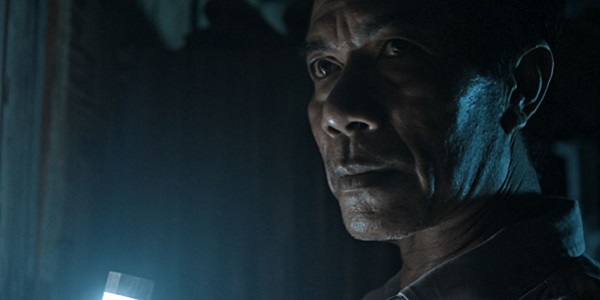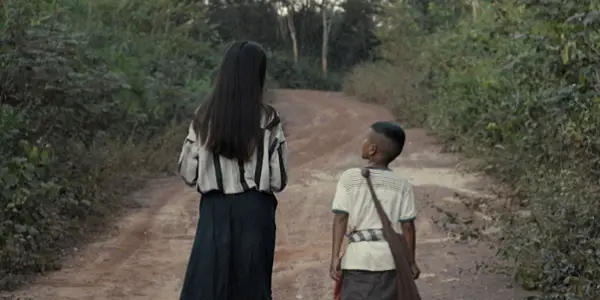THE LONG WALK: Stellar Supernatural Sci-Fi from Laos

Lee Jutton has directed short films starring a killer toaster,…
The third feature film directed by Mattie Do—the first and only female filmmaker in Laos—The Long Walk provides a fresh perspective on the eternal paradoxes of time travel by filtering them through the lens of a ghost story. After making the rounds of the festival circuit, including screening at the Toronto International Film Festival and Fantastic Fest, the film is finally being made available to wider audiences, first through a one-week exclusive digital run hosted by Metrograph At Home, then via digital download. Whatever way you’re able to seek out The Long Walk, rest assured that this special, spooky film is worth your time.
The Haunting
An old man (Yannawoutthi Chanthalungsy) walks the dry and dusty road that leads from his remote home to the nearest village, selling scraps of wire and metal to a junk dealer who pays him via a microchip embedded in his arm. It is clear that we are in the near future, though apart from these microchips, very little modern technology has made its way to this village, which has adapted by catering to urban tourists seeking an escape from the hyper-development of the cities. Many years ago, NGOs appeared in the village, bringing with them solar panels and other supposedly useful things; this wave of modernization has since receded from the rural areas, leaving people like the old man reliant on their own resourcefulness to survive in a world that seems to have forgotten them.

The old man is accompanied on his walks by the ghost (Noutnapha Soydara) of a woman whose death he witnessed fifty years earlier when he was only a child; many villagers claim to have seen them together over the years and eye the old man with trepidation. Around the same time that he met this ghost, his family’s farm started to fail, and his mother (Chanthamone Inoudome) became sick with tuberculosis, dying a horrible, drawn-out death. Filled with regret because he was unable to prevent his mother’s suffering, the old man has secretly “helped ” several other terminally ill women shuffle off this mortal coil over the years.
When the old man realizes that his ghostly companion can help him travel back and forth in time, he becomes set on saving his mother, befriending his younger self (Por Silatsa) in the process. However, his continued attempts to remedy what has plagued his conscience for decades end up altering the future much more than he anticipated.
Twists in Time
The child of Lao refugees, Do was raised in Los Angeles but relocated to Laos in 2010 after her father retired in Vientiane. Collaborating with her screenwriter husband, Christopher Larsen—who scripted The Long Walk as well as her first two features, Chanthaly and Dearest Sister—Do is quickly becoming one of the most vital filmmaking voices in Southeast Asia; the way she uses horror tropes to comment on modern societal issues is reminiscent of the work of Jordan Peele. Her cinematic visions of Laos are important for a multitude of reasons, not least of which is they are free of the colonialist mindset that colors so many Western perspectives on that part of the world. Indeed, in The Long Walk, the poor are not objects to be pitied, nor are the NGOs conquering heroes to be celebrated.
Shot on location in the Lao countryside—primarily out in the open, under natural light—The Long Walk is rich in visual atmosphere, with the natural beauty of the land juxtaposed against the bleak horror of disintegrating corpses and other equally disturbing visions. As played by dancer and choreographer Noutnapha Soydara, the spirit guide who brings the old man into the past barely speaks, but her entire presence is nonetheless suffused with melancholy; when she finally speaks, the weight of her words is all the more considerable.

While the story takes place in the near future, Do doesn’t go out of her way to explain this slightly strange new world to us; she keeps her story intimate, focusing on the old man and his personal quest, and allows us to observe and be immersed in his way of life. We follow him as he stocks his cabinet with herbs and relics, haggles with the junk dealer, and is coerced into contacting the spirit of a recently deceased woman by her anxious daughter (Vilouna Phetmany), who has arrived from Vientiane to close her mother’s noodle shop and take care of other necessary arrangements. The daughter soon becomes a fixture of the old man’s life, one imagines more so than any other living being since his mother’s death. But his continued fixation on the past, and changing it for what he hopes and believes to be the better, ends up altering their relationship in drastic, tragic ways.
The crisscrossing timelines in The Long Walk are constantly in flux, ensuring that the viewer is kept on the edge of their seat throughout, albeit often in a state of confusion—though that really only adds to the tension created by the film. The notion that changing one small thing in the past could ripple outward and affect many more things in the future is not new, but Do’s supernatural spin on it is refreshing. The ghosts of The Long Walk are reminders not just of what was, but also what could have been—a powerful manifestation of the grief and regret that permeates the entire film.
Conclusion
A rich, complex tapestry of a film, woven together with elements of horror and science-fiction, The Long Walk confirms Do as one of the most intriguing new artists working in genre cinema.
What do you think? Have you seen any of Mattie Do’s other films? Share your thoughts in the comments below.
The Long Walk opens for a special one-night-only theatrical screening at Metrograph, and a one-week exclusive digital engagement at Metrograph At Home on February 18, 2022. It will be available for digital download on February 28, 2022.
Watch The Long Walk
Does content like this matter to you?
Become a Member and support film journalism. Unlock access to all of Film Inquiry`s great articles. Join a community of like-minded readers who are passionate about cinema - get access to our private members Network, give back to independent filmmakers, and more.
Lee Jutton has directed short films starring a killer toaster, a killer Christmas tree, and a not-killer leopard. Her writing has appeared in publications such as Film School Rejects, Bitch: A Feminist Response to Pop Culture, Bitch Flicks, TV Fanatic, and Just Press Play. When not watching, making, or writing about films, she can usually be found on Twitter obsessing over soccer, BTS, and her cat.













